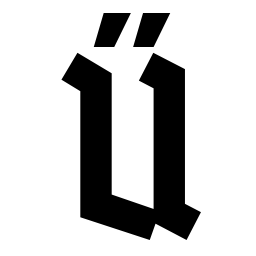Functions¶
Ü supports free functions. Functions have zero or more parameters and can return values.
Exaples of function declarations:
fn Add( i32 x, i32 y ) : i32; // Function has two parameters of type "i32" and returns a value of type "i32".
fn Sleep( f32 sec ); // Function has single parameter of type "f32" and returns no value.
fn GetPi() : f64; // Function has no parameters and returns a value of type "f64".
fn Max( i64& x, i64& y ) : i64&; // Function has two reference parameters of type "i64" and returns a reference of the same type.
Parameters¶
Functions can have value-parameters and reference-parameters.
Reference parameters are defined with & after the type of the parameter.
Parameters may have mutability modifiers mut or imut, that are specified after the type name or after & (for reference parameters).
If there is no mutability modifier specified for a parameter it is assumed to be imut.
For reference parameters mutability modifiers are important for the caller. An immutable reference can’t be passed to mutable reference parameter. For value parameters mutability modifiers have meaning only inside function body. Immutable value arguments can’t be changed inside function body.
Params example:
fn Add( i32 imut x, i32 y ) : i32; // Immutable value parameters. The second parameter is by-default immutable.
fn Inc( u32 &mut x ); // Mutable reference parameter
fn GetLength( ust::string8 &imut str ) : size_type; // Immutable reference parameter
fn GetNumZeros( ust::string8 & str ) : size_type; // Immutable by-default reference parameter
Return value¶
A function may return nothing.
In order to do that it should be declared without any return type or with void.
fn Sleep( f32 sec );
fn USleep( u64 ns ) : void;
A function may return a value. A return type should be specified in order to do that:
fn Add( i32 x, i32 y ) : i32; // return type is "i32"
A function may return a reference - mutable or immutable.
It should be declared with & after the return type name in order to do that.
A mutability modifier mut or imut may be optionally specified.
If there is no mutability modifier it is assumed to be imut.
fn Max( i64& x, i64& y ) : i64 &imut; // Function returns immutable reference of type "i64"
fn Max( u64& x, u64& y ) : u64 &; // Function returns immutable reference of type "u64", "imut" modifier is implicitly applied
fn Max( u64 &mut x, u64 &mut y ) : i64 &mut; // Function returns mutable reference of type "u64"
Functions overloading¶
It’s possible to declare more than one function with the same name in one namespace. But all these functions should have different parameters - different number of them, different types, different mutability (for reference parameters).
fn Foo();
fn Foo(i32 x); // Ok - an overloading with different number of parameters
fn Foo(f32 &imut x); // Ok - an overloading with different parameter type
fn Foo(f32 &mut x); // Ok - an overloading with different parameter mutability
If functions differ by non-parameter properties (return value, unsafe modifier), overloading isn’t possible.
Also it’s impossible to overload a function with only difference in the mutability of a value parameter or with overloading of a value parameter by an immutable reference parameter.
fn Foo() : i32;
fn Foo() unsafe : f32; // Error, overloading is not possible - same signature
fn Bar(i32 mut x);
fn Bar(i32 imut x); // Error, overloading is not possible - only mutability modifier of a value parameter differs
fn Baz(i32 imut x);
fn Baz(i32 &imut x); // Error, overloading is not possible - the only difference is a reference modifier of an immutable parameter
Prototypes and implementations¶
A function declaration with ; at end is only a prototype.
But if after the function declaration follows a body block, this is a function implementation.
// prototype declaration
fn Add( i32 x, i32 y ) : i32;
// implementation
fn Add( i32 x, i32 y ) : i32
{
return x + y;
}
Return value type deduction¶
It’s possible to specify auto as function return type.
In that case the compiler can automatically deduce the return type.
fn Div( i32 x, i32 y ) : auto
{
return x / y; // Return type is "i32"
}
fn Abs( f32 x ) : auto
{
// In all "return" operators return type is "f32"
if( x >= 0.0f ) { return x; }
return -x;
}
Functions with return type deduction have some limitations:
They must have a body
They can’t be recursive
They can’t be coroutines (generators or async functions)
Conditional function presence¶
Sometimes it is necessary to control presence of a function - depending on some condition.
Especially it may be useful in template code.
For that Ü has a special syntax construction - enable_if.
This construction may be specified after fn, optional constexpr, virtual, nomangle modifiers in a function declaration.
After that follows an expression in ().
The expression must be a compile-time constant of type bool.
If the result of the expression is false, this function will not be compiled (neither the declaration nor the body).
auto constexpr is_32bit = typeinfo</size_type/>.size_of == 4s;
// This function exists only on a 32-bit platform
fn enable_if( is_32bit ) Bar();
fn Foo()
{
Bar(); // A compilation error "function not found" will be produced on a 64-bit platform.
}
